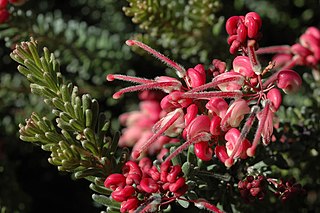
Grevillea lanigera, commonly known as woolly grevillea, is a species of flowering plant in the family Proteaceae and is endemic to south-eastern continental Australia. It is a spreading shrub with narrowly oblong to more or less linear leaves and clusters of pink to red, and cream-coloured flowers.

Grevillea obtecta, commonly known as Fryerstown grevillea, Elphinstone grevillea or Taradale grevillea, is a species of flowering plant in the family Proteaceae and is endemic to Victoria in Australia. It is a prostrate, clumping or straggling shrub with pinnatifid, pinnatipartite or toothed leaves, and toothbrush-like clusters of light green to yellowish and purplish to black flowers with a dull yellow to pink style.
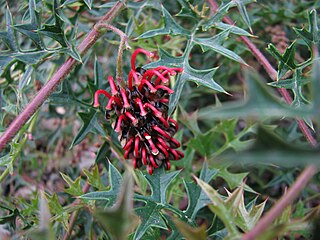
Grevillea montis-cole, commonly known as Mount Cole grevillea, is a species of flowering plant in the family Proteaceae and is endemic to central-western Victoria, Australia. It is a shrub with divided leaves with 5 to 15 lobes, the end lobes more or less triangular to narrowly oblong and sharply-pointed, and clusters of greenish to fawn and dull purplish flowers.

Grevillea acrobotrya is a species of flowering plant in the family Proteaceae and is endemic to the southwest of Western Australia. It is a prickly, spreading to erect shrub with egg-shaped to trowel-shaped leaves with sharply-tipped lobes, and white to cream-coloured flowers with smaller leaves at the base.

Grevillea agrifolia, the blue grevillea, is a species of flowering plant in the family Proteaceae and is native to the north of Western Australia and parts of the Northern Territory. It is a shrub or tree with narrowly oblong leaves with the narrower end towards the base, and creamy-yellow flowers.
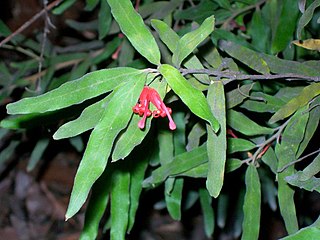
Grevillea mollis, commonly known as soft grevillea, is a species of flowering plant in the family Proteaceae and is endemic to a restricted area of north-eastern New South Wales. It is an open, spreading shrub with oblong to elliptic leaves and loose clusters of bright scarlet red flowers.

Grevillea irrasa is a species of flowering plant in the family Proteaceae and is endemic to south-eastern New South Wales. It is an erect, spreading shrub with oblong to egg-shaped leaves with the narrower end towards the base, and clusters of red to apricot-coloured flowers.
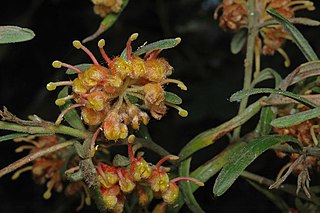
Grevillea polybractea, commonly known as crimson grevillea, is a species of flowering plant in the family Proteaceae and is endemic to the southeast of continental Australia. It is a spreading shrub with linear to narrowly oblong or narrowly elliptic leaves and pink to red and yellow or green flowers.
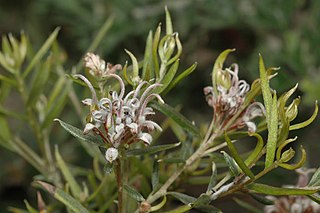
Grevillea phylicoides, commonly known as grey spider flower is a species of flowering plant in the family Proteaceae and is endemic to eastern New South Wales. It is a shrub with more or less elliptic to oblong or lance-shaped leaves and woolly-hairy grey flowers.
Grevillea obtusiflora is a species of flowering plant in the family Proteaceae and is endemic to a small area of eastern New South Wales. It is a low, spreading to erect shrub with many stems, narrowly elliptic to oblong or linear to narrowly egg-shaped leaves with the narrower end towards the base, and pinkish-red and cream-coloured flowers with a red style.
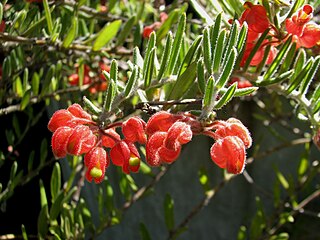
Grevillea saccata, commonly known as pouched grevillea, is a species of flowering plant in the family Proteaceae and is endemic to the south-west of Western Australia. It is a low, spreading to diffuse, scrambling or trailing shrub with linear to oblong or egg-shaped leaves with the narrower end towards the base, and small clusters of red and orange flowers with a lime-green style.

Grevillea quadricauda, commonly known as four-tailed grevillea, is a species of flowering plant in the family Proteaceae and is endemic to eastern Australia. It is an erect, dense, bushy shrub with narrowly egg-shaped to elliptic leaves and small, loose clusters of green and pinkish-red flowers.

Grevillea humilis is a species of flowering plant in the family Proteaceae and is endemic to eastern New South Wales. It is an erect to spreading shrub with narrowly elliptic to more or less linear leaves, and pink or white flowers.

Grevillea fistulosa, commonly known as Barrens grevillea or Mount Barren grevillea, is a species of flowering plant in the family Proteaceae and is endemic to the Fitzgerald River National Park in the south-west of Western Australia. It is an erect shrub with narrowly egg-shaped to broadly linear leaves and clusters of orange-red to scarlet flowers.

Grevillea leiophylla, commonly known as wallum grevillea, or dwarf spider oak, is a species of flowering plant in the family Proteaceae and is endemic to Queensland. It is a weakly erect to low-lying shrub with narrowly oblong to egg-shaped or more or less linear leaves, and clusters of pale to deep pink flowers.

Grevillea leptobotrys, commonly known as tangled grevillea, is a species of flowering plant in the family Proteaceae and is endemic to the south-west of Western Australia. It is a prostrate shrub with simple and toothed, or divided leaves, the lobes further divided, the end lobes triangular, egg-shaped, oblong or more or less linear, and clusters of pale to deep lilac-pink flowers.

Grevillea muelleri is a species of flowering plant in the family Proteaceae and is endemic to the a relatively small area of south-western Western Australia. It is a shrub with linear to narrowly oblong, or divided leaves with linear or narrowly egg-shaped lobes, more or less spherical clusters of white to cream-coloured flowers.

Grevillea occidentalis is a species of flowering plant in the family Proteaceae and is endemic to the south of Western Australia. It is a spreading to erect shrub with linear to narrowly egg-shaped or narrowly elliptic leaves and grey or off-white flowers.

Grevillea quinquenervis, also known as the five-nerved grevillea, is a species of flowering plant in the family Proteaceae and is endemic to the western end of Kangaroo Island in South Australia. It is an erect, dense shrub with more or less linear to oblong or narrowly egg-shaped leaves and clusters of pale to deep pink flowers.

Grevillea goodii, also known as Good's grevillea, is a species of flowering plant in the family Proteaceae and is endemic to the Northern Territory. It is a prostrate shrub with egg-shaped to narrowly elliptic leaves and clusters of light green flowers with a pink to red style.



















